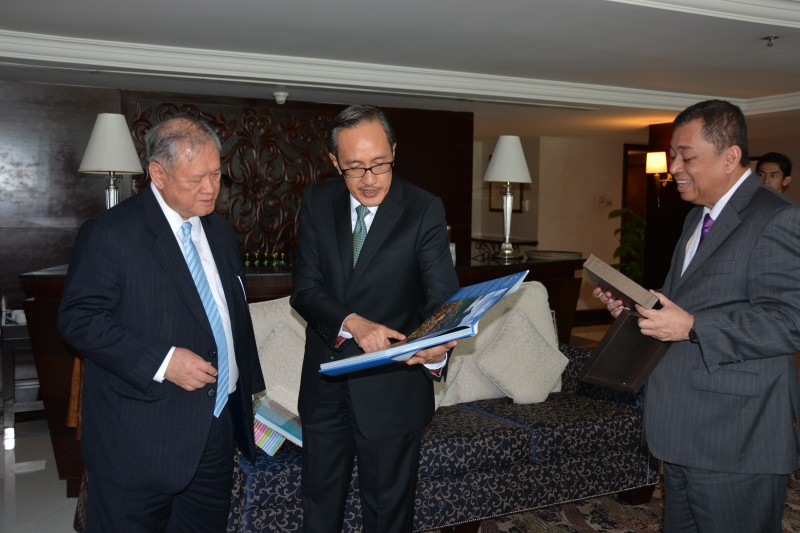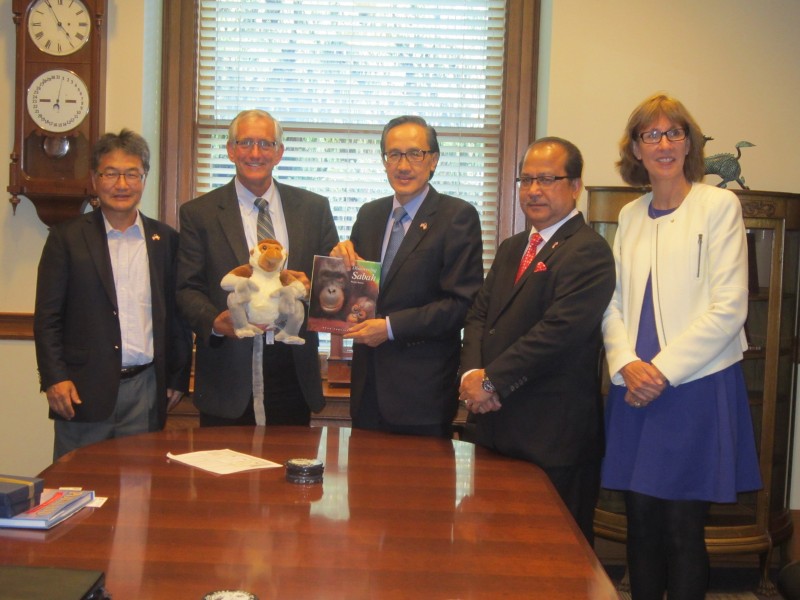Duo on environmental, humanitarian walk
KOTA KINABALU: Two men, each carrying 20kg of backpack, decided to walk 2,500 kilometres from Tawau to Kuching to raise awareness on positive environmental and humanitarian projects in Borneo.
The duo, David Atthowe, 25, from Norfolk England, and Yusep Sukmana, 24, from Bandung Indonesia, calling themselves the Nomadic Lion, attended a press conference here yesterday after 47 days of walking from Tawau to Kota Kinabalu, which covers a distance of 780 kilometres.
Their planned journey which will cover Sabah, Sarawak, and Brunei, will take about five months and will be made into a documentary focusing on positive environmental and humanitarian projects and solutions.
Walking and relying solely on the help of people they meet along the way for food and hospitality, David, the founder of Nomadic Lion, said they had been blessed as the people they meet here (Sabah) are very helpful and supportive towards their cause.
“We share positive stories when learning from the locals here. We focus a lot in documenting our journey and take pictures every day to spread the positivity to the world through the social media,” he said, giving an example that the duo had made the Society for the Deaf in Lahad Datu known to the public.
The project in Borneo is the second walking mission for the duo after completing a 1,100 kilometer-walk in Peninsular Malaysia in February.
“I am passionate about this part of the world and to help people and nature here. We chose Peninsular Malaysia and Borneo to be the venue of our first two projects because they have one of the oldest rainforests in the world and their precious resources,” David said, while pointing out that the people here are incredibly diverse, especially in Borneo.
To date, David’s cause has received an increasing number of followers on social media, including its website (www.nomadiclion.com) and Facebook.
Commenting on his experience gained from the journey, David said he found Peninsular Malaysia very different from Sabah in terms of culture and its people.
“The Borneo people are more similar to those in Kalimantan. In the peninsula, they have a completely different culture compared to Sabah. It is like being in two different countries.
“A lot of people say we are crazy, but we are very passionate about raising awareness as we progress on the walk via our website, social media activities and engaging local people every day, to talk to them about local positive projects,” he explained.
Commenting on their success, David said the walk took 47 days and was tough going at times.
“We were lucky that we have not encountered serious challenges, and we were continuously supported and spurred on by the warm welcome and generosity of the Malaysian people we met on our route,” he explained.
As for David’s partner in the project, Yusep, a student majoring in literature, said he loved the culture, customs and tradition of Sabahans, especially their music.
“I love to see different traditional music genres in different places, which reflect their colourful cultures. I am passionate about music and I love to see how people unite through it,” he said.
Their walk began in Tawau on August 22, and has taken them to Semporna, Kunak, Lahad Datu, Sandakan, Telupid, Ranau, up Mount Kinabalu, and to Kota Kinabalu.
From Kota Kinabalu, they will be going through Brunei before entering Sarawak and walking all the way down to Kuching, where they will finish their journey in February next year.
Throughout their journey, they will visit a number of conservation projects, education projects, community empowerment projects and national parks.
The have visited the PKPKM (Sabah Society for underprivileged children), which is a project working to help provide education to stateless children around Semporna, as well as the Danum Valley Reforestation Project, Sun Bear Conservation Centre, Kinabalu International School, and the Mescot community.
The Nomadic Lion has received a few sponsors locally so far, including from the Sabah Tourism Board, United Sikh, Goldheart Project, Gerakh Sikh, Leap Spiral, PACOS, and three sponsors from London, namely Transglobe Expedition Trust, Water-to-go Foundation, and Naturya.
Also present at the press conference was Sabah Tourism Board chairman (STB), Datuk Joniston Bangkuai, who commented that STB was very happy to be sponsoring the Nomadic Lion’s walk.
Source: Borneo Post





